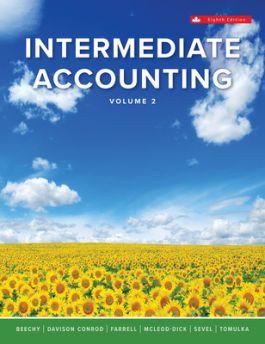Consider the following independent scenarios: Scenario A Wertz Ltd. has a pension plan for its employees. The
Question:
Consider the following independent scenarios:
Scenario A
Wertz Ltd. has a pension plan for its employees. The plan requires that Wertz contribute 4% of employee salaries to a pension fund, managed by a trustee. The fund assets are pooled together and managed collectively, but the fund trustee maintains an allocation of the funds to each individual employee.
Scenario B
Unica Inc. sponsors a pension plan for its members. The fund provides a base-level benefit to employees on retirement, equal to 50% of their last 5 years’ salary. However, if the plan overperforms (i.e., through additional asset returns), the employees are eligible for up to an additional 10% of their last 5 years’ salary. Any excess over this would be pooled and made available to the employer in the form of a reduction of future contributions. If the plan underperforms, both the employees and employer must contribute equal amounts to make up the shortfall. The pension plan is segregated into groups, based on the plan retirement. For example, assets for employees with a retirement date in 0–10 years, 11–20 years, and 20+ years are pooled, and any benefit reductions or required contributions are applied only to that group’s funds.
Scenario C
JJ Gard (JJ) sponsors a pension plan. JJ and the employees contribute equally to the plan. The plan provides a guaranteed benefit of $1,500 per year worked (i.e., 30 years’ service would result in an annual salary of $45,000). Contributions are determined by the actuary, and split equally between employee and employer. If the plan significantly underperforms, there are a series of measures to be taken, including a reduction of benefits. If the plan overperforms, the amount is used to offset future contributions for both the employee and employer.
Required:
Prepare an analysis around the classification for each plan (defined benefit or defined contribution).
Consider the following factors:
• Are the benefits predetermined or “defined” per a predetermined formula?
• Who is ultimately responsible for (benefits from) any funding shortfalls (gains)?
• What other information would be helpful in determining the classification of the plans?
Step by Step Answer:

Intermediate Accounting Volume 2
ISBN: 9781260881240
8th Edition
Authors: Thomas H. Beechy, Joan E. Conrod, Elizabeth Farrell, Ingrid McLeod-Dick, Kayla Tomulka, Romi-Lee Sevel





